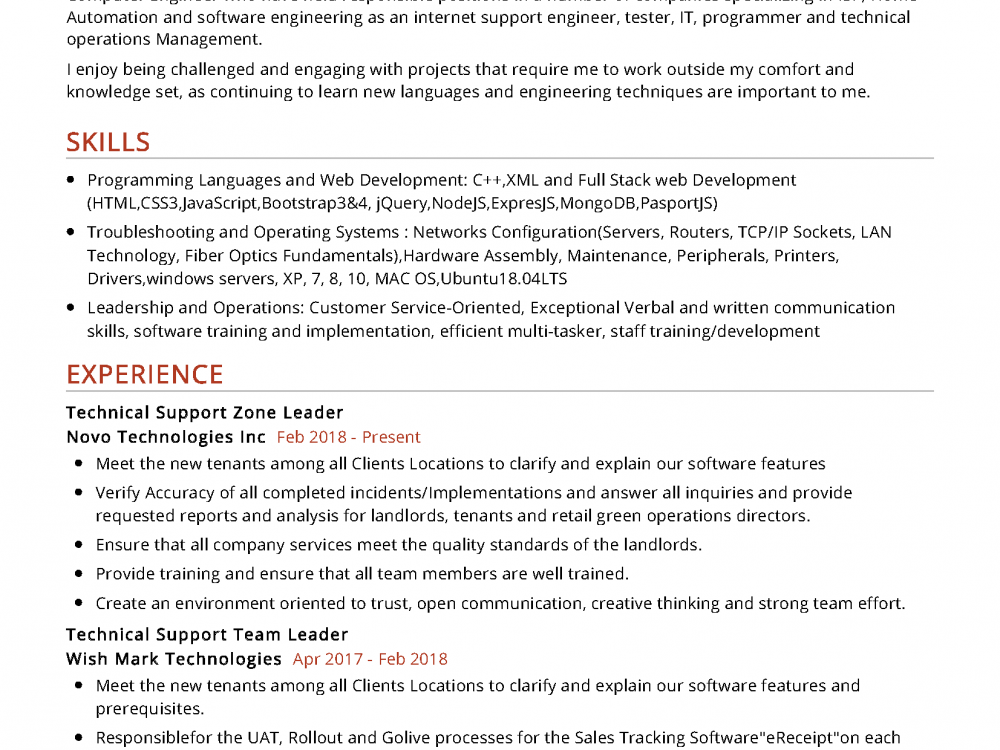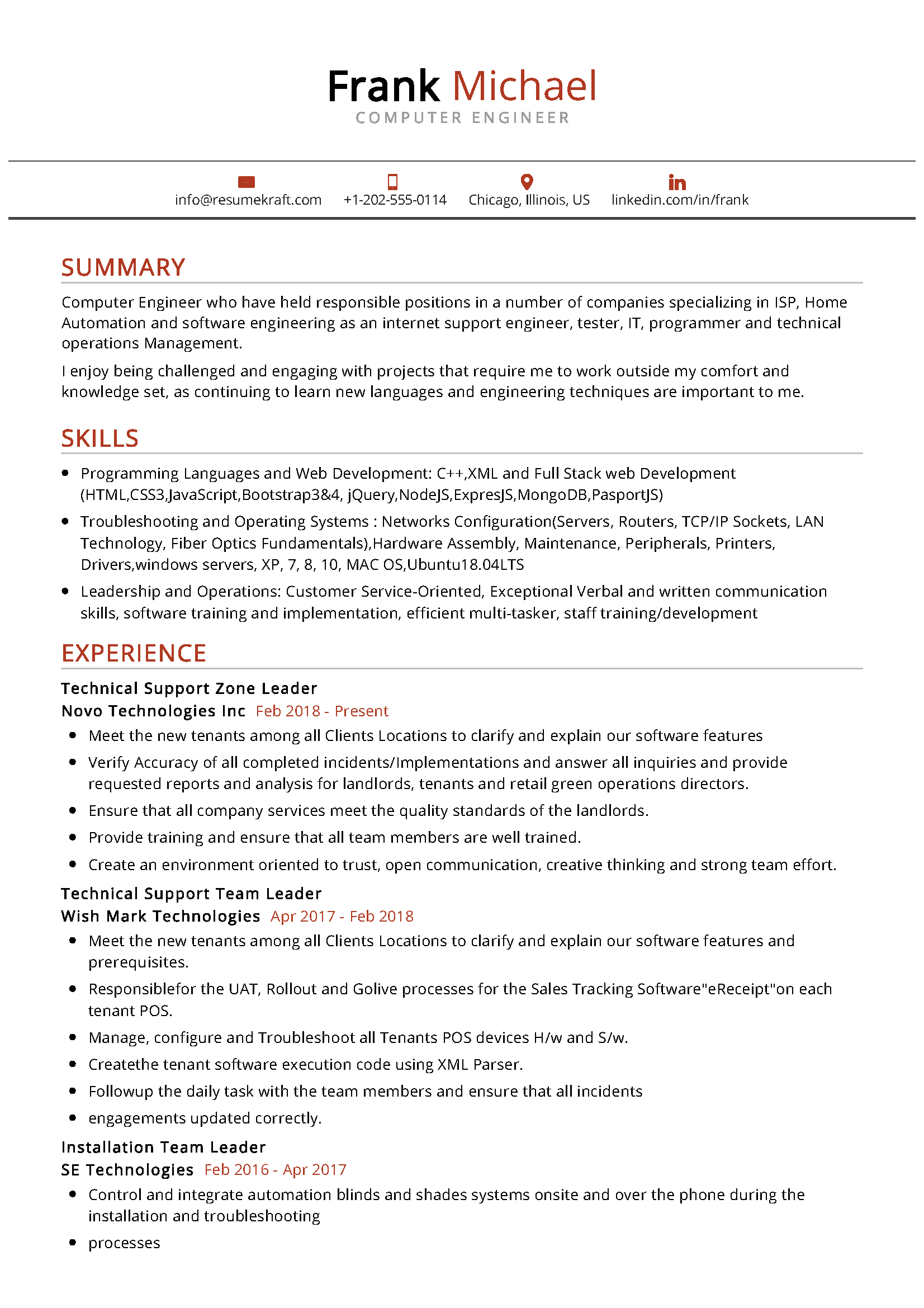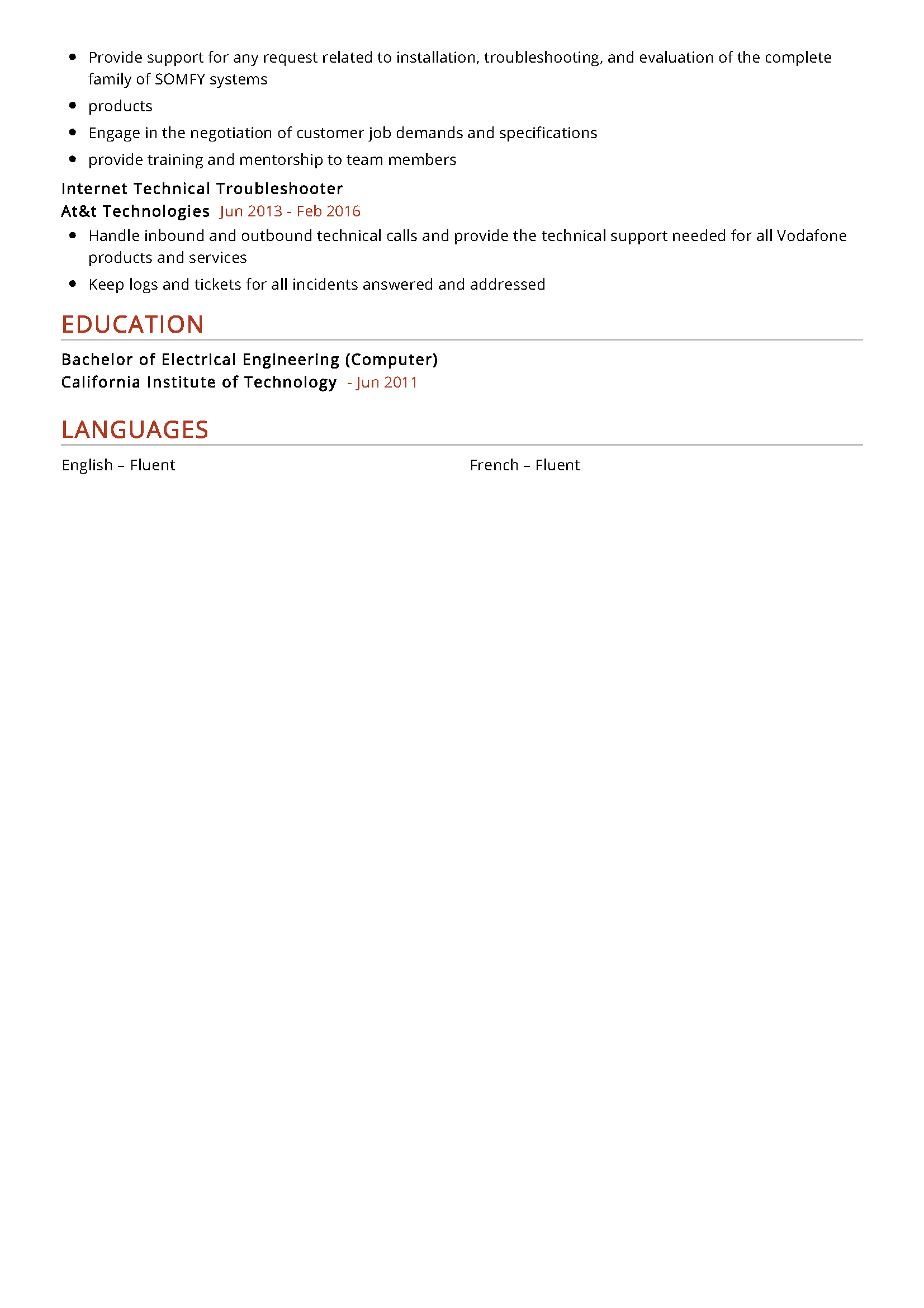Are you a computer engineer by profession and looking for an exciting career? We have good news for you! use our professional Computer Engineer Resume Sample. You don’t have to start writing from scratch. Just click “Edit Resume” and modify it with your details. Update the template fonts and colors have the best chance of landing your dream job. Find more resume samples.
Computer Engineer Resume Sample
Frank Michael
Computer Engineer
Summary
Computer Engineer who has held responsible positions in a number of companies specializing in ISP, Home Automation, and software engineering as an internet support engineer, tester, IT, programmer, and technical operations Management.
I enjoy being challenged and engaging with projects that require me to work outside my comfort and knowledge set, as continuing to learn new languages and engineering techniques are important to me.
Skills
Programming Languages and Web Development: C++,XML and Full-Stack web Development (HTML,CSS3,JavaScript,Bootstrap3&4, jQuery,NodeJS,ExpresJS,MongoDB,PasportJS)
Troubleshooting and Operating Systems: Networks Configuration(Servers, Routers, TCP/IP Sockets, LAN Technology, Fiber Optics Fundamentals), Hardware Assembly, Maintenance, Peripherals, Printers, Drivers, windows servers, XP, 7, 8, 10, MAC OS, Ubuntu18.04LTS
Leadership and Operations: Customer Service-Oriented, Exceptional Verbal and written communication skills, software training and implementation, efficient multi-tasker, staff training/development
Experience
Technical Support Zone Leader
Novo Technologies Inc
- Meet the new tenants among all Clients Locations to clarify and explain our software features
- Verify Accuracy of all completed incidents/Implementations and answer all inquiries and provide requested reports and analysis for landlords, tenants and retail green operations directors.
- Ensure that all company services meet the quality standards of the landlords.
- Provide training and ensure that all team members are well trained.
- Create an environment oriented to trust, open communication, creative thinking and strong team effort.
Technical Support Team Leader
Wish Mark Technologies
- Meet the new tenants among all Clients Locations to clarify and explain our software features and prerequisites.
- Responsible for the UAT, Rollout, and Golive processes for the Sales Tracking Software”eReceipt”on each tenant POS.
- Manage, configure, and Troubleshoot all Tenants POS devices H/w and S/w.
- Create the tenant software execution code using XML Parser.
- Followup the daily task with the team members and ensure that all incidents
- engagements updated correctly.
Installation Team Leader
SE Technologies
- Control and integrate automation blinds and shades systems onsite and over the phone during the installation and troubleshooting
- processes
- Provide support for any request related to installation, troubleshooting, and evaluation of the complete family of SOMFY systems
- products
- Engage in the negotiation of customer job demands and specifications
- provide training and mentorship to team members
Internet Technical Troubleshooter
At&t Technologies
- Handle inbound and outbound technical calls and provide the technical support needed for all Vodafone products and services
- Keep logs and tickets for all incidents answered and addressed
Education
Bachelor of Electrical Engineering (Computer)
California Institute of Technology
Languages
English – Fluent
French – Fluent
Career Expert Tips:
- Always make sure you choose the perfect resume format to suit your professional experience.
- Ensure that you know how to write a resume in a way that highlights your competencies.
- Check the expert curated popular good CV and resume examples
Computer Engineer Resume with Writing Guide
If you’re a recent graduate or someone looking to break into the world of Computer Engineers, you’re going to need a resume.
Unfortunately, it’s not something that comes to your mind easily and it seems like there are no right answers. After all, though computers have been around in some form for decades, we’re only now starting to see tangible applications of what some engineers can do and how they might be able to make a career out of them.
When it comes to writing a resume for a job you’re applying for, there are some rules that are universal. But, many aspects of your resume should be tailored to the job you’re applying for.
Computer Engineer Resume Writing Guide:
1. Customize your resume to the company
This is probably the most important rule for writing a resume. Employees in the Human Resources Department of company X will not know that you worked as a student engineer in company Y and therefore did a lot of designing computer systems from scratch using a new programming language. Instead, try to find out what they’re looking for, but don’t just call them up! Instead, they’re going to want to see your resume.
2. Include your education in reverse chronological order
Most people will look more favorably on a college graduate with a good GPA and extra activities. In the first paragraph of your resume, you can say that you graduated in May 2012 with a BS in Computer Engineering and an emphasis on software design and networking.
3. Your education should be the first thing listed
If you’re an experienced professional, it’s important to know what degree you’re working towards because employers want people who are career-minded. They’re looking for people who will stick around and be reliable. So if you’re working towards a degree that isn’t listed or in the process of being transferred, it’s important to show off your working experience.
3. Your job history should be listed in reverse chronological order
This is almost as important as education. If you’ve been at a company for 10 years, but don’t have any experience from your first three jobs, that could hurt you in an interview. Instead, have your most recent job come up last!
4. In each job, include your main responsibilities
You should be as specific as possible and include any special projects or duties you performed in the job. If you handled a lot of things for a company, note them so that they can see your experience.
5. Only list positions of responsibility
No one is going to look at your experience unless they know what it covers or what schools you went to. So don’t leave off any jobs where you were an intern or worked in the mailroom!
6. Try to not be too verbose
This is a tricky one because you have to make sure you can get your point across without sounding too wordy. If you’re the president of your school’s computer club, say that. If you’re an experienced developer for a company, mention that.
7. Follow any other rules for resumes (i.e., formatting)
Looking at a resume and pointing out mistakes is what’s known as “red-flagging”. Make sure to follow the formatting rules just like you would with your resume.
8. Don’t be too caught up in creds
Highlighting and adding special awards or accomplishments can make your resume look unfocused. If you were on a team, include what you did together in the summary section later on down the page if it’s important enough. It’s not vital to list each award you received, but try to make sure that they’re relevant to what’s being asked for in the job posting.
9. Keep the formatting simple
Resumes are a lot more than just raw text. They’re like an advertisement for you and your skills. To get that across to a potential employer, you have to not only keep it short but use sub-headings and bullet points.
10. Keep it updated
It’s important that you can update your resume if new positions pop up or others disappear.
Top 15 Computer Engineer Skills:
- Excellent verbal and written communication skills
- Problem analysis, troubleshooting, and repair
- Knowledge of business English, spelling, grammar, punctuation, usage, and mechanics
- Knowledge of computer hardware and software applications
- Knowledge of computer programming logic; algorithms; sequences; procedures
- Accurate typing skills including spelling and grammar; entry accuracy rate at or above 95% of total entries made per day (95%)
- Ability to work under pressure (e.g. deadlines) and to work independently
- Good organizational skills
- Computer hardware and software installation, repair, and modification
- Ability to work with others (esp. in multi-tasking environments or under pressure)
- Excellent customer service skills or ability to operate effectively in a customer-facing role (e.g., sales, services)
- Ability to integrate design trends and expected user needs into system design
- Ability to perform moderately complex analytical tasks (e.g. data analysis, computer simulations)
- Overall understanding of business logic and procedures
- Experience in the following types of systems: dynamic hierarchies; complex networked systems (e.g., distributed computing, client/server, client/client); multimedia; and supercomputers
Computer Engineer Job Profile:
Computer engineers can be found working in a wide variety of settings. Each job has unique challenges that require the expert skills of computer engineers to execute their duties effectively and efficiently.
Tips:
- Customize your resume to the employer
- Make sure proper formatting is followed
- Be realistic with your education section
- Make sure to list all positions of responsibility
- Don’t be too verbose or too long-winded in your resume
- Learn more about formatting via an online guide or handbook
Computer engineering, also known as electrical engineering (EE), is a professional engineering discipline and a branch of electrical engineering that develops hardware, software, electronics, embedded systems, and computer networking for information processing.
Computer Engineer Resume Objective:
The objective is to inform the potential employer of what you have the skills to do as a computer engineer. Some engineers are self-taught or have trained themselves using a variety of resources. Therefore, this section should give the reader a good idea of where you can apply your skills.
Tips:
- It can be either a concise list of skills or a few paragraphs that explain what you have the ability to do – as long as it stands out from the rest of the resume!
- Be able to describe each skill in the same way as the way you would describe it to someone in person.
- Shorter is better, but don’t sacrifice quality for quantity.
- Keep your objective-oriented at all times with your resume to make sure it doesn’t go on a tangent.
- Don’t make your objective too vague. You want your employer to know exactly what you can do for them.
- Focus on skills that are relevant and important to the position, but don’t burn yourself out by focusing too much on one particular area.
- Be sure you can write as well as describe these skills!
- List any prior work experience or internships that would help show off your skills to potential employers in the job field.
An example objective for a computer engineer with experience in computer hardware and software design is “To help clients and customers solve their technological problems through research, design, development, testing and evaluation.
Key Takeaways:
- Be concise
- keep your objective short and to the point with as little information as possible.
- Keep your formatting standard
- use one or two fonts in a simple, readable font.
- Showcase relevant skills
- focus on the skills you have that are most applicable to the job requirements for that particular job and role.



